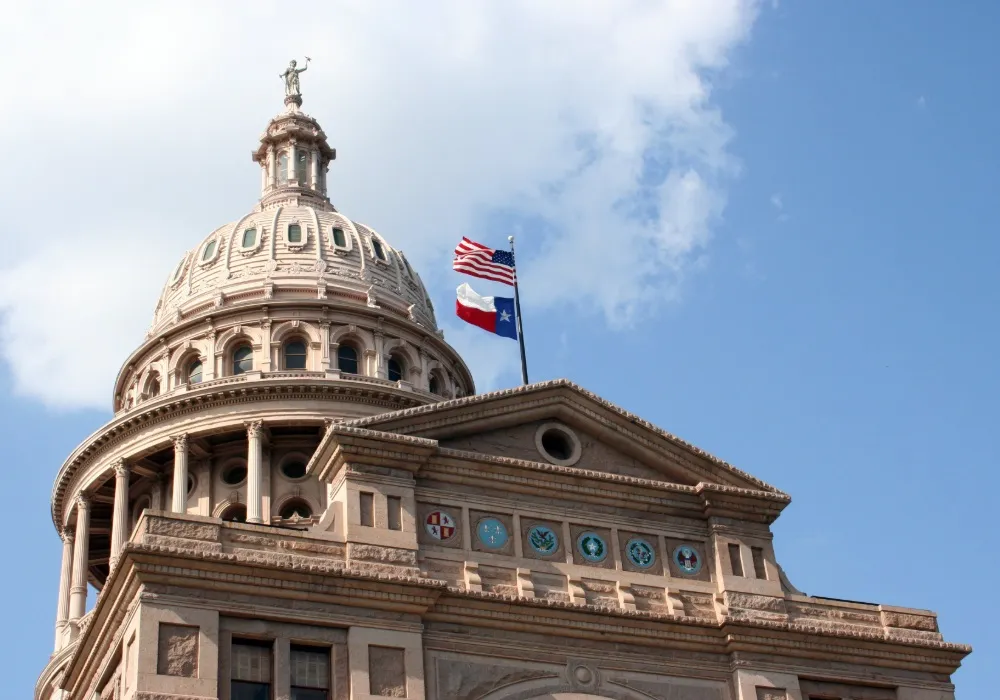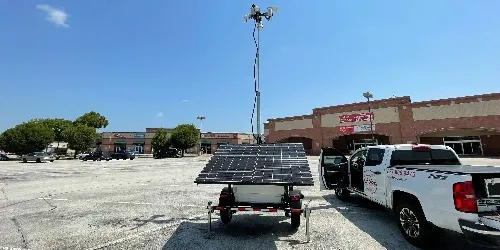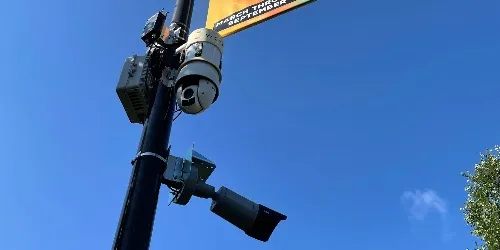We outline the key legislations governing the use of surveillance cameras in the State of Texas as of April 2024. Keep informed and stay compliant with WCCTV's expert guidance.
From ranches to metroplexes, oilfields to solar farms, and skyscrapers to sporting arenas, Texas has one of the most uniquely diverse landscapes found anywhere on earth.
However, with the second-highest population of any state in the US and the 8th largest economy in the world, it also has a growing need to protect its people and places from the threat of crime.
Surveillance cameras, also known as pole cameras, are fast becoming a go-to for many businesses, property owners, and law enforcement looking to secure what matters most to them.
As surveillance technology evolves at an ever-increasing rate, and with a marketplace almost as diverse as the Lone Star state itself, making the right choices and keeping informed of the laws governing the use of these systems is becoming more challenging.
Proudly headquartered in Texas, WCCTV is well-placed to help explain the key legislation relating to the use of surveillance cameras in our home state. Learn more below.
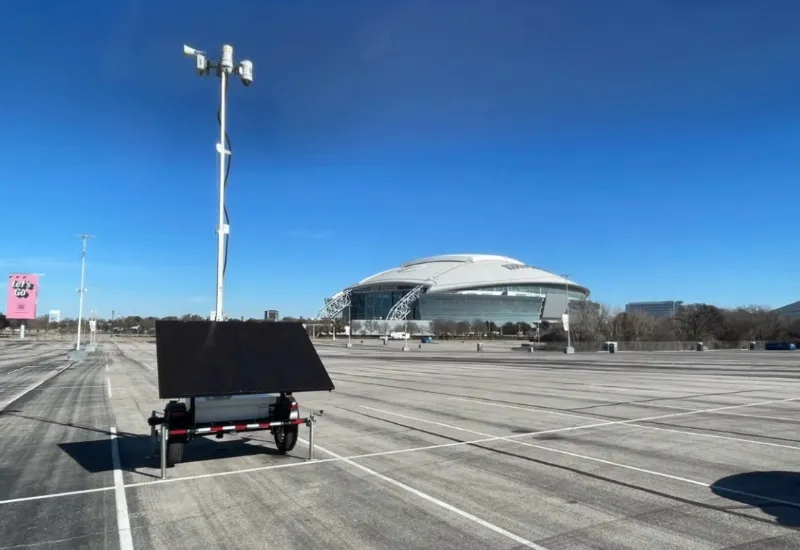
Surveillance Camera Laws in Texas: Overview
The most important thing to note is that Texas, in common with most states, allows for the use of surveillance cameras for both personal and business security.
You have every right to defend yourself against crime via the use of surveillance technology and remote video monitoring.
There are, however, a number of laws that dictate exactly where cameras can be placed, where their use is prohibited, and how they record.
What is Considered Illegal Surveillance in Texas?
Texas Penal Code 43.26 explicitly forbids what it refers to as invasive recordings - the installation of surveillance cameras in locations where they are highly likely to infringe upon an individual's privacy.
In short, this means no cameras in restrooms, locker rooms, and changing rooms, which frankly seems like common sense to us!
Is it Legal for Surveillance Cameras to Record Audio in Texas?
Recording audio is something of a grey area, and the legality of such practices relies entirely on consent.
Texas operates a 'one-party' consent rule, meaning that if you want to record a conversation, you must have the express permission of at least one participant.
There are several State-specific laws in Texas pertaining to the recording of audio, including:
-
Section 16.02 of the Texas Penal Code: a State law that governs unlawful use, interception, or disclosure of a wire, oral, or electronic communication.
-
Section 21.15 of the Texas Penal Code: a State law that outlines the criminal offense of invasive visual recording.
-
Chapter 119 in Title 18 of the U.S. Code of Federal Law about the interception of oral, electronic, and wire communications.
The Federal Communications Commission directives relating to recording audio state that you must:
-
Obtain verbal or written consent before making the recording
-
A verbal notification before the conversation begins (e.g., “This phone call is being recorded for quality control purposes…”)
-
An audible beep or tone that’s repeated at regular intervals during the duration of the conversation
While these rules do not solely relate to surveillance cameras in the same way the 'invasive video recordings' law does, they are a broader set of principles that must be adhered to by anyone involved in public or private surveillance.
Do I Need to Post Signs if I Have Installed Surveillance Cameras in Texas?
In short, no. There are no requirements in Texas, or any other State, to post notices that you have installed surveillance cameras as long as they are in a public place.
Many businesses will still choose to display signs, but these are typically used to warn or deter criminals rather than to comply with laws.
For example, when we supply surveillance cameras or solar trailer to secure a construction jobsite, we provide you with the highly visible signage shown below as part of our overall deterrent package.
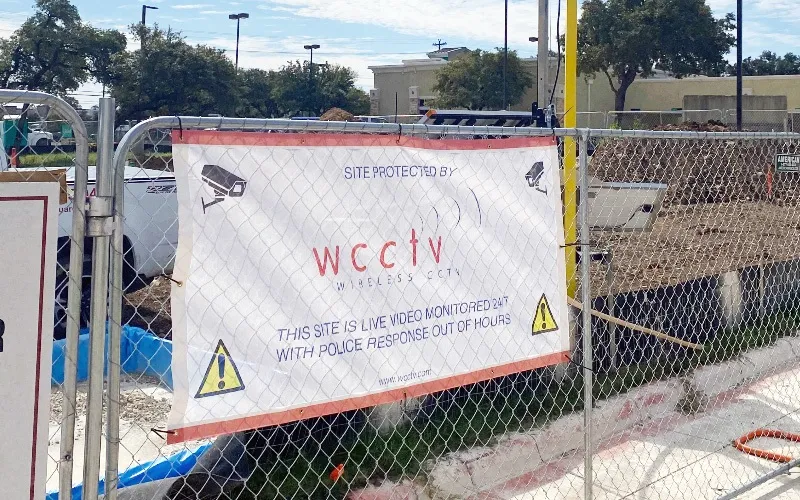
Do Surveillance Camera Installers in Texas Require a License?
Yes, a license is required to deliver any security-related services in Texas.
These services can include installing security cameras, alarm systems, locks, being a security guard, fire alarm systems, training guard dogs, and being a private investigator, to mention a few.
Any company offering camera installation without a license directly violates State laws.
The Texas Private Security Bureau, a Texas Department Of Public Safety's Regulatory Services Division division, regulates all of these services. If you are considering using a surveillance camera service in Texas, always look for a Company's TX DPS Private Security License number.
Using a licensed installer offers multiple benefits, too, including:
-
Professional installation with effective camera placement to keep your organization secure and compliant
-
Quality workmanship to protect against electrical issues and camera failure
-
Recourse through your state licensing entity if the installer does a poor job
-
Protection against scammers, fraud, and criminals who use security camera installation as a cover
Are Covert Surveillance Cameras Legal in Texas?
Covert (or hidden/disguised) surveillance cameras are specifically designed to blend into their environment and operate undetected.
Unlike typical surveillance cameras that offer a physical deterrent to crime, covert units are used primarily to gather video evidence to aid in criminal investigations.
Using this type of surveillance camera is legal in Texas, but in line with the laws stated above, they should not be used to violate an individual's right to privacy.
How Long Can Surveillance Camera Footage Be Stored in Texas?
Unlike many states, Texas has no stated limits on how long law enforcement can retain data collected from surveillance cameras.
While no specific laws exist to govern this process, WCCTV typically advises that surveillance camera footage is stored for no more than 30 days unless it is required as part of an ongoing investigation.
How Do I Ensure My Use of Surveillance Cameras Complies With Texas Laws?
Some best practices WCCTV recommends to ensure you comply with Texas laws include:
-
Only install cameras in places where there is no expectation of privacy
-
Utilize signage to inform people that they are in a monitored area
-
Understand and adhere to state and federal video and audio recording regulations
-
Consult with legal counsel and surveillance camera experts to keep up-to-date with changes in surveillance laws and technology
Summary
Surveillance cameras remain one of the most effective ways of protecting people and property from the threat of crime, and their proportionate and legal usage, alongside other security measures, will help all types of businesses safeguard their assets.
Texas State laws do not seek to prohibit their usage; they aim to balance security and the right to privacy - protecting your property whilst respecting and upholding individuals' privacy and trust.
If you have any questions, concerns, or doubts, consult with legal and/or security equipment experts to tailor your surveillance practices to align with both state laws and ethical considerations.
WCCTV: Surveillance Camera Experts in Texas
WCCTV is the USA's leading supplier of mobile surveillance cameras, helping state, federal, and local governments enhance public safety, as well as helping private businesses secure their valuable assets.
We are proudly headquartered in Dallas, with additional offices in Houston and Austin. If you want to make informed choices about choosing the right surveillance camera for your town, city, parking lot, or construction job site, get in touch today.
